
Guests
- Gayle McLaughlinmayor of Richmond, California, and member of the Green Party.
- Andres SotoRichmond organizer for Communities for a Better Environment.
More than 900 people have sought medical treatment following a massive fire at a Chevron oil refinery in Richmond, California. Tens of thousands of area residents were ordered to stay in their homes with the windows and doors closed after a series of blasts Monday sparked blazing fires that sent huge plumes of smoke. Chevron now says the situation is under control. We talk with Richmond Mayor Gayle McLaughlin, a member of the Green Party, who is seeking a full investigation into the blaze. “We have a community that’s been fighting Chevron for a long time. And I’m proud to and honored to stand for that community,” McLaughlin said. We’re also joined by Andres Soto, the Richmond organizer for Communities for a Better Environment, an environmental justice group that has previously sued Chevron over what it says was a shoddy environmental impact report. “They refuse to sit at the table. They refuse to negotiate in good faith with the community over a wide range of issues, whether it’s fair taxation or whether it’s environmental safety and environmental justice,” Soto said. [includes rush transcript]
Transcript
NERMEEN SHAIKH: We go now to Richmond, California, where over 900 people have sought medical treatment at local hospitals following a massive fire at a Chevron oil refinery, the second largest in the state. A series of blasts erupted early Monday evening sparking the blazing fires that sent large plumes of smoke into the sky. Tens of thousands of residents of Richmond, North Richmond and San Pablo were ordered to stay in their homes with the windows and doors closed to avoid breathing in hazardous fumes. Local authorities issued a level three warning for fire, meaning it can cause eye, skin, nose or respiratory irritation. Residents interviewed by KTVU reported numerous health issues connected to the fire.
RICHMOND RESIDENT: We’re feeling like the tightness of the chest, the watery eyes. And my son, he’s complaining about his throat and his nose, so…
NERMEEN SHAIKH: The Chevron fire in Richmond is the latest in a series of fires at the more than 100-year-old Richmond plant. Analysts say this most recent fire will push gas prices over the $4 mark on the West Coast. Chevron says the situation is under control. An answering message on the company’s Richmond community hotline yesterday said the fire has been fully contained.
CHEVRON GENERAL INFORMATION HOTLINE: Hello, this is the Chevron general information hotline for Richmond, California, for Monday, August 6, at 11:30 p.m. We would like to again apologize to the community for the fire and smoke that occurred this evening at our Richmond refinery. The fire began at approximately 6:30 in our number four crude unit. At this time, the fire is fully contained, and the shelter-in-place warning has been lifted by the Contra Costa Health Services Department. We are working closely with local, state and federal government agencies, who are on site to determine the exact cause of the incident and to address any current issues and concerns.
AMY GOODMAN: Chevron occupies over 13 percent of Richmond’s land and, according to the California Air Resources Board, emits more greenhouse gas pollution than any other facility in California. Many who grew up in the refinery’s shadow have memories of illnesses caused by spills. Community activists have also accused Chevron of using its local economic clout to minimize taxes and skirt environmental regulations. Chevron, however, says it’s a good neighbor that bolsters the economy of Richmond and its surroundings.
Democracy Now! invited Chevron to join us on the show. They did not respond to our repeated phone calls. We’re going to Berkeley, California, now, where we’re joined by two guests. Mayor Gayle McLaughlin of Richmond, California, a member of the Green Party, is seeking a full investigation, from both Chevron and independent sources, into the fire. And we’re joined by Andres Soto, Richmond organizer for Communities for a Better Environment. The environmental justice group has previously sued Chevron over what it says was a shoddy environmental impact report.
We welcome you both to Democracy Now! Let’s begin with Mayor McLaughlin. There was a fiery meeting last night, hundreds of residents demanding answers from Chevron and local authorities. Can you talk about what is happening now and what it is that you’re demanding?
MAYOR GAYLE McLAUGHLIN: Yes. Thank you, Amy, for having me.
This situation is totally unacceptable, that every few years we have these disastrous situations with fires and impact on the health of our community. And last night, Chevron held a town hall meeting in response to residents’ concerns, you know, concerns about the fact that they had to shelter in place for hours, you know, through the night and Monday evening and into Tuesday morning. The meeting showed that people were extremely upset. People were voicing their empowerment, stating that they needed to hear from Chevron what are the causes of—what were the root causes of the situation and how they were going to implement a more safe refinery and how the community warning system could work better.
So, what I’m calling for—and this is something I’ve been calling for throughout this process—is a full, transparent investigation, not only by Chevron but by independent sources, so that we can get a full analysis of what—of what caused this fire and how we can assure the safety of our community, that has suffered for decades from environmental injustice. So, our efforts are going to be strong, continuous. And, you know, as a progressive elected official, along with a couple other progressives on the city council, we’re there to stand for the residents. And we have this big 1 percenter in our community, and it’s clear that we are still in battle with them and will continue to be until they understand that they can’t make these—they have to do better by our community and make sure that our community is safe from any harm.
NERMEEN SHAIKH: Mayor McLaughlin, for our audiences who don’t know, can you describe the demographic in Richmond?
MAYOR GAYLE McLAUGHLIN: Yes. We have a predominantly people of color community. We have about—almost 40 percent of our community is Latino, close to 30 percent African American. We have an Asian population, Native American. Particularly around the refinery, we have people of color, low-income community. You know, we have a community that has suffered social injustice, economic injustice, racial injustice, environmental injustice. So, we have a community that’s been fighting Chevron for a long time. And I’m proud to and honored to stand for that community.
AMY GOODMAN: I want to turn to an interview that KGO, local ABC in San Francisco, did with a Chevron refinery spokesperson, Walt Gill, shortly after the Chevron fire began.
KGO: Well, we heard some of our viewers tell us that they heard an explosion around 6:35, 6:40. Are you aware of that?
WALT GILL: No, we have no understanding of anything in the way of explosions here, just the fire that resulted from an unknown source at our crude unit.
KGO: So, the crews on scene there, as you mentioned, immediately were on that at 6:15. Were they unable to really get control of that? Is that why we saw things really erupt around 6:35?
WALT GILL: Well, part of what you saw—by the way, we do have a world-class fire—
KGO: Yeah.
WALT GILL: —department on hand—
KGO: Yes, absolutely.
WALT GILL: —that’s well stocked. Part of the flame that’s being seen is due to our flares, and flares are safety devices that are used to burn off the hydrocarbons and the fuels that are in the units, so they can safely be depressurized. So that’s some of the smoke and fire that people are seeing.
AMY GOODMAN: That is a Chevron spokesperson. Andres Soto also with us, Richmond organizer for Communities for a Better Environment. Andres, describe for us what exactly it’s like to be there right now in Richmond. What are—how—talk about the fire, the chemicals that have been released, what you understand happened, and how residents are responding.
ANDRES SOTO: Yeah. Well, thank you for having me, Amy, as well.
You know, this was a very dramatic and shocking event, particularly in Richmond and San Pablo and the areas that were subject to the shelter-in-place-order. It was—you know, it started out with these explosions and then a huge mushroom cloud over the city. And at first, you know, there was no news coverage. It was—at least locally, the Bay Area hadn’t—the media hadn’t gotten aware of it. And then, all of a sudden it was on, you know, all the television, radio stations, everybody was paying attention. By then, that cloud started to spread both eastward and then over the hills going northward and eastward, blanketing neighboring communities.
And so, you know, this is one of the most serious environmental disasters that’s happened to the Bay Area. We’ve seen a number of them, like the Cosco Busan and a shipping disaster and other environmental disasters, but this one, you know, with the sirens, when they finally went off, it was like living in a war zone, where you have, you know, this toxic cloud overhead and these sirens going on. It was a very scary place to be. Many people then started showing up at the hospitals locally, as you reported. And so, it’s a major trauma to the community. And last night, at the dog and pony show that Chevron put on at the Richmond Auditorium, it was clear that the emotions, the anger that the community was feeling really boiled over. And the Chevron people, you know, heard that voice loud and clear.
And, you know, from moving forward now, they’re trying to get approval of their so-called plant upgrade, and they have to go through an approval process of the city of Richmond, with—that includes the planning commission and the city council. In the past when they did it, they tried to push through their approval with an inadequate EIR. Communities for a Better Environment went to court. The judge upheld the action and—you know, against Chevron’s desires. And they now have to deal with the city in a new and different fashion. They’ve also attempted to influence local politics and have influenced local politics for a century. And just in the most recent election, 2010, they spent a million dollars alone on three candidates. And all three of those candidates lost. So they have a very difficult public relations problem with the community of Richmond. And we’re going to hold their feet to the fire as we move forward.
NERMEEN SHAIKH: Well, Chevron says it’s fully prepared to deal with the situation. Let’s turn to another excerpt of the company’s voice message on its Richmond community hotline yesterday.
CHEVRON GENERAL INFORMATION HOTLINE: We have comprehensive plans and procedures in place to respond to situations like this one, and we are responding to this incident as quickly as we can and are deploying highly trained personnel to assess and manage the situation. We are currently taking the appropriate measures necessary to address and provide for the safety and security of our facilities, our employees, contractor personnel and surrounding community and residents.
NERMEEN SHAIKH: Andres Soto, could you comment on what the Chevron spokesperson said? Chevron is also the largest private employer, by far, in Richmond.
ANDRES SOTO: Right. Well, yeah, the history of Chevron actually predates the incorporation of the city of Richmond by a few years. And so, it’s always been a specter looming within the city—largest taxpayer, largest employer. But right now, as it exists, Chevron employs—less than 5 percent of its employees are actually local Richmond residents. So, it’s a misnomer that they’re a solution to the local jobs situation.
But, you know, realistically, what we’ve seen is nothing but spin out of the refinery. On the one hand, they apologize to the community, is how they always lead their statements off. But realistically, they came out and they were blaming the same community and the environmentalists for them not being able to modernize and upgrade their operation there at the Richmond refinery, when in fact we know that this unit, the crude unit that actually caught on fire and blew up, it was never part of that upgrade program. And they could have ensured the safety of this thing, in general. But it’s that mendacity, you know, the misrepresentation of the truth that Chevron is engaging in that, you know, makes it very difficult to deal with them. They refuse to sit at the table. They refuse to negotiate in good faith with the community over a wide range of issues, whether it’s fair taxation or whether it’s environmental safety and environmental justice.
AMY GOODMAN: Andres, can you tell us—
ANDRES SOTO: You know, they’re an international corporation.
AMY GOODMAN: Andres, can you tell us—
ANDRES SOTO: Sure, go ahead.
AMY GOODMAN: Do you know the chemicals that have been released into the environment?
ANDRES SOTO: Well, what I understand from the people who study the science, it’s a whole range of hydrocarbons. You know, we suspect that this is some of that high sulfur content, dirtier crude from the Canadian tar sands that may have been involved with this. And so, you know, there’s exotic metals. It’s a whole toxic stew of chemicals that were released into the broader environment, and not just in our local community but throughout the region.
AMY GOODMAN: And I interrupted you when you were talking about Chevron being an international corporation.
ANDRES SOTO: Right. I mean, this is one of the biggest, you know, international, multinational corporations. And, you know, we’ve seen how they’ve dealt with the people in Nigeria. In fact, their mouthpiece in Richmond, Heather Kulp, was assigned to Nigeria before they assigned her to Richmond, you know, where they’ve actually used the Nigerian army to kill people. We know in Ecuador they bought, you know, the processing of the oil there, the wells there and the extraction, and have left a toxic mess, you know, that was started by Texaco. And they’re ignoring the fine that the Ecuadorean government has imposed. Then, down in Brazil, we see them taking action where they’ve actually indicted Chevron executives for offshore oil drilling accidents and spills. And so, you know, looking at that, that’s actually a role model. Unfortunately, over here, nobody is talking about arresting Nigel Hearne and his crew for the Chevron experience the other day, the environmental disaster we suffered.
NERMEEN SHAIKH: Andres Soto, I want to ask you more about Chevron in Ecuador. Earlier this year, Ecuadorean plaintiffs launched a new effort to recoup the $18 billion in damages that Chevron has refused to pay for polluting Ecuador’s rainforest since the 1970s. Amazonian residents won the judgment last year after a long-running case seeking damages for Chevron’s dumping of toxic oil waste. Chevron has helped avoid the fine by dissolving its assets inside Ecuador. In late June, the plaintiffs filed suit against Chevron Holdings in Brazil in a bid to target Chevron Worldwide. A similar lawsuit was filed in Canada in May. Juan Pablo Sáenz, a lawyer in the case, said Chevron’s actions had left the plaintiffs with with no choice but to pursue the company around the globe.
JUAN PABLO SÁENZ: [translated] Because Chevron is failing to comply with the sentences in Ecuador, we are obligated to look for a series of countries where they have interests and directly attack those interests to be able to collect the amount of money ordered to repair the Ecuadorean Amazon.
NERMEEN SHAIKH: Andres Soto?
ANDRES SOTO: Yeah, well, you know, Chevron is behaving as an international criminal corporation. In fact last night in Richmond, that’s what some folks were calling them. And this kind of behavior, this irresponsible corporate behavior, is, in our community, masked by, you know, giving chump change out to local nonprofits to keep them quiet, to remove them from the debate, you know, community leadership. But at the same time, you know, they’re not fooling everybody. And we see this reckless behavior of avoiding these judgments in other countries, while right in our own county they’ve been appealing their property taxes and found—actually were found to owe more taxes than they actually paid. We’ve seen where they’ve tried to evade revealing their energy usage to avoid paying utility users’ tax locally. They had to reach a settlement on that. And yet and still, they have millions of dollars to spend on influencing local politics. And this kind of, you know, corporate criminal behavior is not fooling the people of Richmond.
MAYOR GAYLE McLAUGHLIN: We actually have a—
AMY GOODMAN: Finally, we just have about 30 seconds, and I did want to go back to Mayor McLaughlin. You are one of the only Green Party mayors in the country. And under your watch here, the Chevron plant has had this major fire. Your final comments about what you feel needs to happen?
MAYOR GAYLE McLAUGHLIN: Absolutely. Well, we have been fighting Chevron since I was elected, and by efforts of a councilmember before I was elected, we have a progressive movement in the city of Richmond. And since our efforts, the progressives on the council, Chevron has no longer dominated city hall. And we have two new progressives running this particular election, and we need to get them on board, because we have two continued councilmembers in the pockets of Chevron. So our—we’re, in so many ways, a leading environmental city based on our initiatives. So, with a stronger voice, with a super majority of progressives through the Richmond Progressive Alliance on the city council, we will be able to hold Chevron totally accountable by our votes, by regulating them, by not giving them a permit for their new proposal, unless they put in the highest safety precautions and the highest assurance that they won’t be refining this dirty, heavy crude that can cause more explosions and cause more harm to our community.
AMY GOODMAN: We want to thank—
MAYOR GAYLE McLAUGHLIN: So we have the political muscle—
AMY GOODMAN: We want to thank you both very much—
MAYOR GAYLE McLAUGHLIN: —and we want to keep it moving.
AMY GOODMAN: —for being with us. Mayor Gayle McLaughlin of Richmond, California, member of the Green Party, seeking a full investigation from both Chevron and independent sources into the fire, and Andres Soto, Richmond organizer for Communities for a Better Environment. We’re going to take a brief break and then go to Texas to talk about Marvin Wilson, the execution of a man whose IQ was 61. Stay with us.

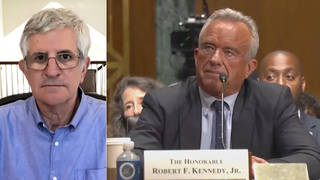
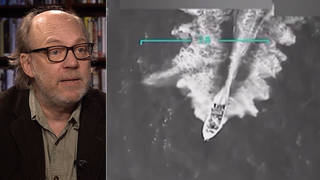
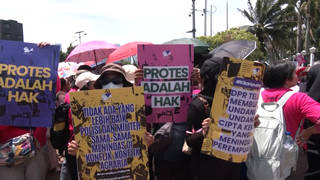
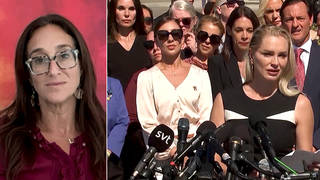






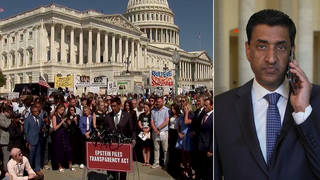
Media Options